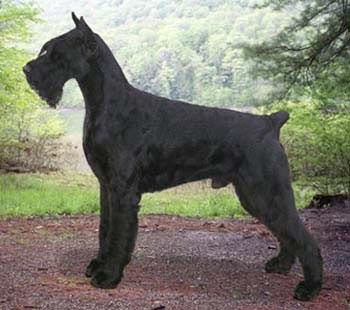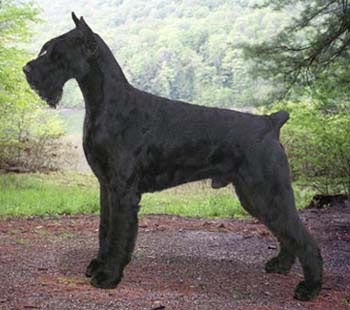 [stextbox id=”info” caption=”Breed characteristics” collapsing=”false” float=”true” align=”left” width=”250″ bgcolor=”40D9FF” bgcolorto=”40D9FF”]
[stextbox id=”info” caption=”Breed characteristics” collapsing=”false” float=”true” align=”left” width=”250″ bgcolor=”40D9FF” bgcolorto=”40D9FF”]
Kid friendly 
Dog friendly 
Cat friendly 
Intelligence 
Easy to train 
Grooming 
Shedding 
Adaptability 
[/stextbox]
Information
[stextbox id=”info” caption=”Breed information” collapsing=”false” bgcolor=”ffb83c” bgcolorto=”ffb83c”]
Name Giant Schnauzer
Other names Riesenschnauzer, Munchener, Russian Bear Schnauzer
Origin Germany
Size Giant dog breeds
Group Working Dog Breeds (AKC); Guardian Dog (UKC)
Height Males: about 26 – 28 inches (app. 66 – 71 cm); Females: about 23 – 26 inches (app. 58 – 66 cm)
Weight Males: About 60 – 80 lbs (approx. 27 – 36 kg); Females: 55 – 35 lbs (25 – 34 kg)
Color Black; Salt and Pepper
Litter size –
Life span About 12 years
[/stextbox]
The Giant Schnauzer is the biggest out of the three Schnauzer breeds as you can probably tell by its name. It was developed in Germany with the aim of driving cattle and was later used for work in butcher shops, as well as at stockyards. Some representatives of the breed were used as guard dogs at breweries.
The breed is characterized with having a calm, loving temperament that makes it a perfect companion dog, while also having the assertiveness, boldness and energy level needed to make a proper guard and working dog. The Giant Schnauzer is very protective of his home and family and is ready to defend them at all times necessary. He is a strong territorial dog that does not trust strangers. Giant Schnauzers are usually aggressive with other dogs, especially with those of the same sex, and you should not trust them alone with cats, despite how well they might seem to get along with one another.
He is highly intelligent which can pose a challenge to an inexperienced trainer. The breed requires consistent and firm guidance during the training process. Without it, the German Schnauzer is quite capable of thinking on his own and will run the household the way he thinks it should be ran.
The outer coat of the Giant Schnauzer is wiry, hard, and dense, but beneath there is a soft undercoat. You have to brush the double coat with the use of a stiff bristle or slicker brush roughly three times a week in order to prevent the formation of mats in the undercoat. You should hand-strip his coat every 4 to 6 months. Keep in mind that if you opt in for clipping the coat of your Schnauzer instead of stripping it, it will eventually change its texture.

